- Home
- Diane Gaston
The Lord's Highland Temptation (HQR Historical)
The Lord's Highland Temptation (HQR Historical) Read online
A soldier burdened by guilt...
...to the future Earl of Foxgrove?
Captain Lucas Johns-Ives is injured in the same battle that killed his brother. Haunted by loss, Lucas is saved by Mairi Wallace. In this Highland idyll, masquerading as her family’s butler, Lucas can avoid the responsibilities of becoming the new earl. He’s tempted by Mairi’s sweetness—but to win her hand, he must face his demons and claim his noble birthright...
“I should not have touched you.” Or almost kissed you, he added silently.
“Why?” Mairi said softly. “It is not as though you are really a servant, are you, Lucas? You were a soldier.”
This was his chance to tell her who he really was, but the gunfire sounded again.
“I was a soldier, but I grew up in a great house.” Let her believe he was John Lucas. “In any event, I should not have behaved as I did toward you. It was wrong of me.”
She let go of him and walked a little faster, putting herself a step or two ahead of him. He caught up
to her.
“I know you are right,” she said, but her tone was sharp.
Had she wanted the kiss? He’d thought so. He’d been too familiar with her. In his father’s house he would not dream of becoming so involved with—say—one of the maids. But she was not a maid, and he was not really a butler. How had this become so complicated?
Author Note
Readers like to ask where we romance authors get our ideas and often I am unable to answer such a question. This time, though, I know exactly where this story idea came from. The Lord’s Highland Temptation was inspired by a Hollywood movie. Two, actually.
My Man Godfrey, in both versions, is a comedy in which a wealthy man is mistaken for a homeless person and winds up becoming the butler to an eccentric family. In the end he winds up with the quirky younger sister. In both versions, though, I thought the moviemakers missed a better story. The oldest daughter, the serious one, would have made a much better romantic heroine. She had so much more room to grow.
Of course, my story is not a comedy and Mairi and Lucas must endure some dark places before they find their happy ending. But while you read their story, look for glimmers of My Man Godfrey. They are in there!
PS—The settings in The Lord’s Highland Temptation were loosely based on Auchinleck House in Ayrshire and Blair Castle in Pitlochry, two of my favorite places from my 2018 visit to Scotland with Number One London Tours.
DIANE GASTON
The Lord’s Highland Temptation
Diane Gaston’s dream job was always to write romance novels. One day she dared to pursue that dream and has never looked back. Her books have won romance’s highest honors: the RITA® Award, the National Readers’ Choice Award, the HOLT Medallion, the Golden Quill and the Golden Heart® Award. She lives in Virginia with her husband and three very ordinary house cats. Diane loves to hear from readers and friends. Visit her website at dianegaston.com.
Books by Diane Gaston
Harlequin Historical
The Lord’s Highland Temptation
The Governess Swap
A Lady Becomes a Governess
Shipwrecked with the Captain
The Society of Wicked Gentlemen
A Pregnant Courtesan for the Rake
The Scandalous Summerfields
Bound by Duty
Bound by One Scandalous Night
Bound by a Scandalous Secret
Bound by Their Secret Passion
Visit the Author Profile page
at Harlequin.com for more titles.
Join Harlequin My Rewards today and earn a FREE ebook!
Click here to Join Harlequin My Rewards
http://www.harlequin.com/myrewards.html?mt=loyalty&cmpid=EBOOBPBPA201602010002
To Henriette and Liz, my wonderful friends and former coworkers
Contents
Chapter One
Chapter Two
Chapter Three
Chapter Four
Chapter Five
Chapter Six
Chapter Seven
Chapter Eight
Chapter Nine
Chapter Ten
Chapter Eleven
Chapter Twelve
Chapter Thirteen
Chapter Fourteen
Chapter Fifteen
Chapter Sixteen
Chapter Seventeen
Chapter Eighteen
Chapter Nineteen
Chapter Twenty
Chapter Twenty-One
Chapter Twenty-Two
Epilogue
Excerpt from A Family for the Widowed Governess by Ann Lethbridge
Chapter One
Scotland—September 1816
The thundering of a thousand horses’ hooves, the roar of the charge, the screams of the injured pounded across Lucas Johns-Ives’s brain. He slashed at the French soldiers, so many caught off guard by the British cavalry, easy prey for their sabres. The charge had begun in glory, but now it was slaughter—blood everywhere, men crying out in agony, horses falling.
Dimly, the sound of a bugle reached Lucas’s ears. Ta-ta-ta. Ta-ta-ta. Over and over. The signal to retreat. They’d ridden far enough. Done enough. Killed enough. Time to retreat.
Where was Bradleigh?
Lucas searched for his brother and spied him still waving his sword, his eyes bulging, a maniacal grimace on his face. He’d been so angry at Bradleigh, angry enough to refuse to ride next to him. Let his brother fight on his own for once.
But now Lucas shouted in a voice thick with panic, ‘Bradleigh! Bradleigh! Retreat! We’ve ridden too far. Bradleigh!’
From the corner of his eye, Lucas saw a thousand French cavalry on fresh horses galloping closer, swords drawn.
His brother took no heed.
‘Bradleigh! Bradleigh!’
Bradleigh impaled a blue-coated French soldier through the neck, pulled back his sword, dripping with the man’s blood. He laughed like a madman.
Lucas spurred his horse to catch up to him. He’d pull his brother out of danger, just as he’d promised their father. Drag him back to the Allied lines. He’d save Bradleigh from himself.
He was almost there, almost at his brother’s side, but then suddenly a French cuirassier on a huge black horse roared between them. Lucas pulled on his horse’s reins to avoid crashing into the man and beast. The cuirassier charged to his brother, raised his sword and ran it through his brother’s chest.
‘No!’ Lucas cried as his brother’s blood spurted and his body fell from his horse. ‘No!’
* * *
‘I love the stone circle.’ The melodic voice of a young girl broke into Lucas’s reverie, melting away the sounds and sights of the battle.
The girlish voice laughed. ‘Remember how we played here?’
Lucas shook his head. It could not be. This was Belgium, was it not? Where was the battle? Where was his brother?
Suddenly the air smelled of wet grass and a breeze cooled his burning skin. He’d been walking, he remembered. He’d felt light-headed and queasy—nothing another bottle of fine Scottish whisky couldn’t cure. Had the drink caused the dream? Was this a dream? If so, which was the dream: the battle or the melodic voice?
‘That was when we were mere children,’ another voice answered. A boy’s voice this time. ‘Or at least when I was a child. You still are one.’
‘I am not,’ the girl protested. ‘Four
teen is not a child.’
‘Ha!’ the boy responded. ‘Wait until you are sixteen. Then you will know fourteen is a child.’
The girl harrumphed. ‘Oh, yes. You are so grown up.’ Her voice changed. ‘Niven, look! There is a man in the circle.’
‘Where?’ he answered.
‘There. On the ground beneath one of the larger stones.’
Lucas heard them move closer.
‘Who is it?’ the boy asked.
‘I do not know,’ the girl replied. ‘He’s a stranger.’
‘Stuff!’ the boy said. ‘There are no strangers hereabouts. Not on our land, anyway. We know everybody.’
Their land? Where was he, if not Belgium? Where had the stench of blood and gunpowder gone?
Lucas struggled to open his eyes, but the light stung them. He braced himself against the stone at his back and tried to rise. ‘Bradleigh.’
His legs wouldn’t hold him. He collapsed, scraping his head as he fell.
Their footsteps scrambled towards him and he forced his eyes open a slit. Two young people, a girl and a boy, floated into view, like apparitions.
‘Sir! Sir! Are you hurt?’ The girl leaned down to him, but she was just a blur.
Lucas tried to speak, but the darkness overtook him.
* * *
Mairi Wallace shook the dirt from her apron and lifted the basket of beets, carrots and radishes that she’d gathered from the kitchen garden. What a scolding she’d receive if her mother knew she’d been digging in the dirt.
‘Now, Mairi,’ her mother would say in her most patient but disapproving voice. ‘It is not fitting for a baron’s daughter to gather vegetables. If you must put yourself out in the sun, cut flowers. You are not a kitchen maid, after all.’
Except that all the kitchen maids except Evie had left. So many of their servants had bolted for positions that actually paid their wages that the household was woefully understaffed. Only two housemaids remained and two footmen. Mairi did not mind taking on some of their work. She rather liked the sun and fresh air on such a fine Scottish day.
She turned and gazed over the wall and caught sight of her younger brother, Niven, running down the hill as if the devil himself was after him.
Mairi frowned. Had he not gone for a walk with Davina? Mairi’s heart beat faster. Where was Davina?
She dropped the basket and ran through the gate.
‘Mairi! Mairi!’ Niven called. ‘Come quick! I need you!’
Mairi rushed to his side. ‘What is it? Is it Davina?’
‘No. Well, a little.’ He fought to catch his breath. ‘Oh, just come with me. Now.’
Niven, at sixteen, was old enough to have some sense, but he was as impulsive and impractical as their father. This would not be the first time Mairi had had to pull him out of a scrape. But Davina, their younger sister, was typically more prudent. Slightly.
What did he mean, a little? Was she hurt? If something had happened to Davina, she could not bear it!
Mairi followed Niven over the hill and to a part of their land that remained rustic and wild. They rushed too fast for talking. Niven led her to the stone circle, a place of danger, magic and mystery, according to family lore. She saw Davina silhouetted against the sky, the stones framing her. The ache in Mairi’s throat eased a little.
Davina ran to meet them. ‘Mairi! I am so glad you are here. We did not know what to do.’
Mairi wanted to embrace her in relief, but held back. ‘Do? About what?’
Davina gestured for her to follow, leading her into the circle where a man—a stranger—was slumped against one of the stones, no hat on his head, his grey topcoat open and his clothing underneath rumpled and stained.
Two empty whisky bottles lay at his side.
Mairi’s skin grew cold.
‘He’s passed out,’ Davina said. ‘I believe he is sick.’
Drunk, more like.
Mairi seized her by the shoulder. ‘Did he hurt you?’
‘Hurt me?’ Davina pulled away. ‘What a silly question. We found him leaning against the stone. When we called out, he tried to rise, but he collapsed again. I sent Niven for help.’ She knelt at the man’s side. ‘I think he is feverish.’
Mairi wanted to drag Davina away from him. Her sister had no idea how dangerous a man—a drunkard—could be.
But the stranger was senseless at the moment, so there was no immediate threat. Mairi leaned down close.
Davina touched the stranger’s forehead. ‘He feels hot to me.’
The man was pale, but fine-looking. Fair-haired. A chiselled chin, strong nose, and lips befitting a Greek statue.
‘Is he dead?’ Niven asked.
Mairi forced herself to press her fingers against the side of his neck. She felt a pulse. ‘He is alive.’ She placed her palm against his brow. ‘He is feverish, though.’
‘Do you suppose the Druids got him? Mayhap he came here at midnight.’ Niven spoke in all seriousness.
Tales of the Druids had abounded for generations. It was said their spirits would rise to attack anyone disturbing their midnight frolic amid the stones.
His clothes were damp.
‘More likely he was caught in last night’s rain,’ Mairi said. What had he been doing on these hills in the middle of their land? The dampness of his clothing indicated he might have been there all night.
Davina’s voice rose. ‘We must be like the Good Samaritan.’
Davina had heard the sermon on Sunday? Mairi had thought she’d been too besotted with Laird Buchan’s youngest son to heed Vicar Hill.
‘We cannot leave him here,’ Davina went on.
Leave him was precisely what Mairi wished to do. She wanted to run from him and take her brother and sister with her.
‘No, we cannot leave him,’ she said instead. He was ill, even if he was also drunk. He was in need.
And he could pose no danger in the state he was in. Could he?
She reached out her hand, but almost took it back again. She made herself shake the man’s shoulder. ‘Sir! Sir! Wake up.’
His eyes opened—blue eyes, vivid blue eyes—but they immediately rolled back in his head. They would never get him on his feet. And he was too big for them to carry.
Mairi turned to her sister. ‘Davina, run back to the stables. Tell MacKay or John to come and bring a wagon.’
MacKay, older than their father, had stayed on as their stableman, and John was his only stable worker. In better times they’d had five or six men keeping the horses and carriages in fine order.
‘Me?’ Davina protested. ‘I want to stay. Have Niven go.’
‘I’ll go,’ Niven said.
Mairi didn’t want Davina anywhere near this stranger, but nor did she wish to explain why.
‘Very well,’ she conceded. ‘Niven, you go get the wagon.’
He dashed off.
It would take a long time for a wagon to wind its way around the hills to the stone circle. They would have to wait with him all that time.
‘We will take him to our house, won’t we, Mairi?’ Davina asked. ‘Not to the village, surely.’
Why not the village? Mairi thought.
‘Who would care for him in the village?’ Davina went on. ‘We can nurse him until he gets better.’
Mairi did not want this man under their roof, but it made better sense to take him to their house. The village was further away and there was no guarantee someone would agree to care for him.
‘We should summon the doctor, too,’ Davina said.
How would they pay the doctor, then? This man would have to pay. If he had money. And if he had money, why had he been caught out wandering in the hills and not in some snug and dry inn?
‘Should I run to the village for the doctor?’ Davina asked.
Davina go alon
e to the village? Mairi hated it when Davina walked alone to the village, although no one but she knew to worry about it. On the other hand, she certainly did not wish to leave Davina alone with this strange man. Mairi trembled at the thought.
And at the memory of when she’d encountered a stranger while alone, a man who’d also been full of drink. Mairi did not want to be alone with another stranger.
But this man was obviously very sick. How would she feel if he died for lack of a doctor’s care? Her heart pounded.
What if the man died before help arrived? And what if Mairi left Davina alone to care for him? Davina was too young for such a burden.
‘Yes.’ Mairi nodded. ‘Excellent idea. I will stay here and wait for Niven to come with the wagon. We will meet you back at the house.’
‘I will run like the wind,’ Davina said dramatically.
Mairi watched her run down the hill where she’d meet the road and still have another three miles to go until she reached the village.
Mairi sat on the still-damp grass next to the man. ‘At least you are no threat to me,’ she murmured.
His eyes opened again and he suddenly lurched forward, seizing her by the shoulders.
She shrieked.
‘My brother,’ he rasped, his eyes wild. ‘Bradleigh.’
He tried to stand and she scrambled away from his grasp.
He staggered, touching the stone to steady himself. He looked around, staring in her direction, but she had the notion he did not see her. He was somewhere else in his delirium.
‘Must find Bradleigh,’ he said again.
Mairi could not breathe.
He took a step towards her, but swayed and reached for the stone again. ‘Must... Bradleigh...’ He slid down the stone, insensible once more.
Mairi sat with her hands pressed against her face. He didn’t move.
Was he dead? She was not so heartless that she wanted him dead. But she was still afraid of him. She remembered a man’s fingers around her neck, forcing her to the ground...
She made herself stare at the stranger until she could see his chest rise and fall. He was still alive. She approached him once more and manoeuvred him so that the stone shaded him from the sun. Then she sat on the ground again.

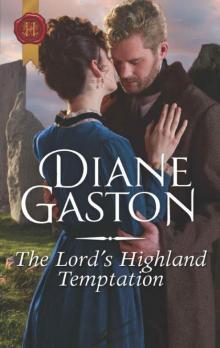 The Lord's Highland Temptation (HQR Historical)
The Lord's Highland Temptation (HQR Historical)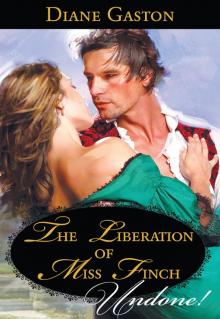 The Liberation of Miss Finch
The Liberation of Miss Finch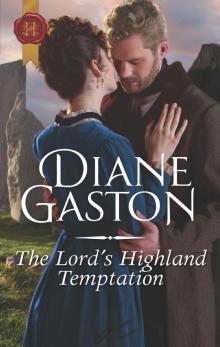 The Lord's Highland Temptation
The Lord's Highland Temptation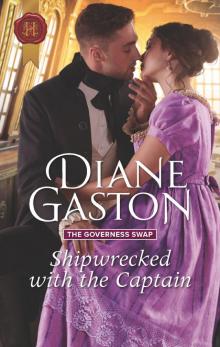 Shipwrecked with the Captain
Shipwrecked with the Captain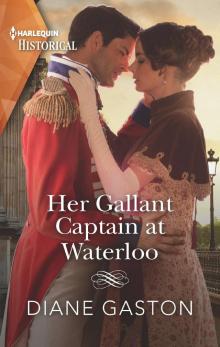 Her Gallant Captain at Waterloo
Her Gallant Captain at Waterloo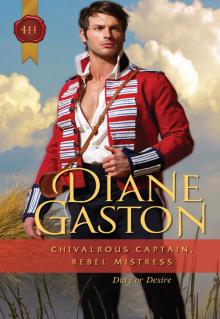 Chivalrous Captain, Rebel Mistress
Chivalrous Captain, Rebel Mistress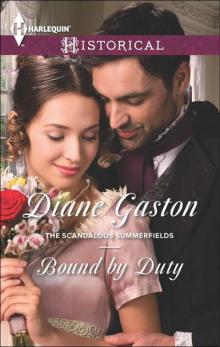 Bound by Duty
Bound by Duty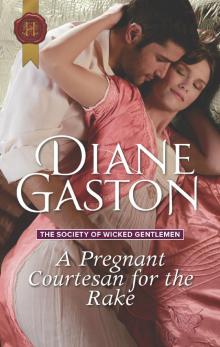 A Pregnant Courtesan for the Rake
A Pregnant Courtesan for the Rake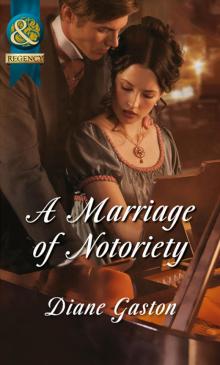 A Marriage of Notoriety
A Marriage of Notoriety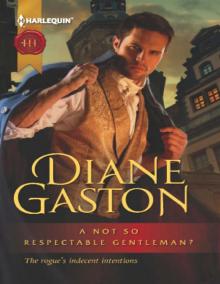 A Not So Respectable Gentleman?
A Not So Respectable Gentleman?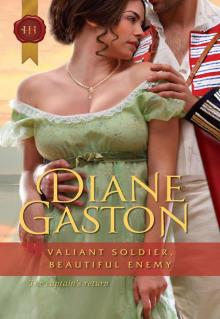 Valiant Soldier, Beautiful Enemy
Valiant Soldier, Beautiful Enemy A Reputation for Notoriety
A Reputation for Notoriety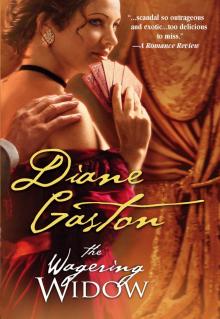 The Wagering Widow
The Wagering Widow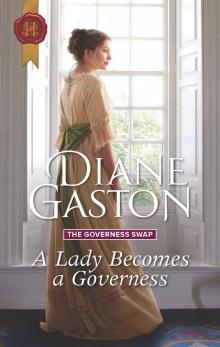 A Lady Becomes a Governess
A Lady Becomes a Governess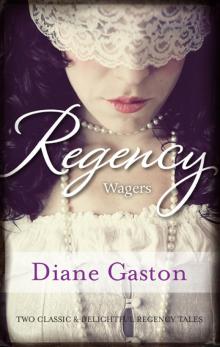 Regency Wagers
Regency Wagers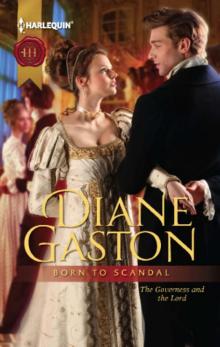 Born to Scandal
Born to Scandal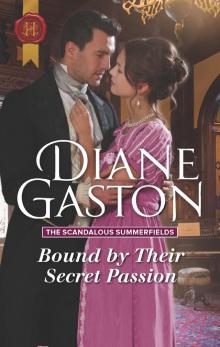 Bound by Their Secret Passion
Bound by Their Secret Passion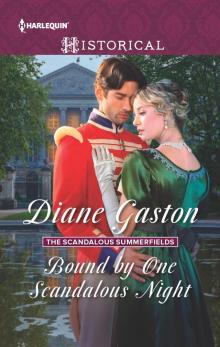 Bound by One Scandalous Night
Bound by One Scandalous Night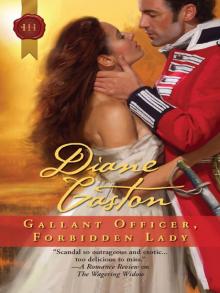 Gallant Officer, Forbidden Lady
Gallant Officer, Forbidden Lady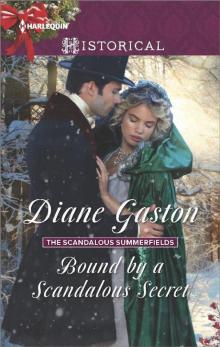 Bound by a Scandalous Secret (The Scandalous Summerfields)
Bound by a Scandalous Secret (The Scandalous Summerfields)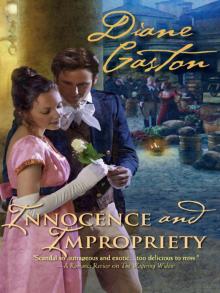 Innocence and Impropriety
Innocence and Impropriety